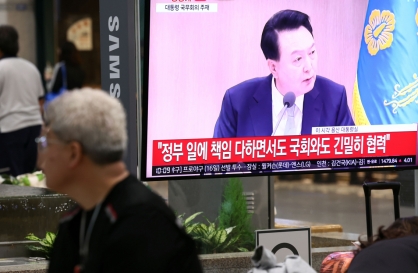The concept of eco-design, adding environmental value to design or vice versa, is taking root in Korea as people open their eyes to the importance of the environment and eschew instant gratification when it involves products that pollute.
Recognizing the huge economic potential of eco-design, the government is running various programs to help businesses and individuals commercialize their creative eco-friendly ideas. Marketers are utilizing this concept on their own by focusing on an expanding segment of consumers who are concerned with environment and energy issues.
“Eco-design could be one way of realizing the current government’s vision of a ‘creative economy,’” said Seok Sung-woo, a director of the Korea Environmental Industry & Technology Institute.
In a bid to support aspiring eco-designers, the institute plans to select 20 creative eco-design ideas ― 10 from companies and 10 from individuals ― through an open competition this year. Those selected will receive funds and assistance for product development or patent registration.
The Korea Institute of Industrial Technology, another government agency promoting eco-design among local businesses, held an international symposium on eco-design in December last year to explore future state policies to nurture eco-design.
“Our past support programs were focused on getting local firms to adapt to tighter environmental regulations in Europe. Now we have taken a step further, assisting companies in developing their own eco-design products and services,” said Hong Seok-jin, a researcher at Korea Institute of Industrial Technology.
Samsung and LG have adopted a carbon-recording system in which carbon dioxide emissions are taken into account from the very beginning of product design. LG aims to increase sales from the green business to 15 percent while Samsung is said to have enhanced energy efficiency by 31.4 percent between 2008 and 2009 through eco-design programs.
Electronics giant Philips has also carried out the “Simple Switch” campaign, promoting easy methods of saving energy and money.
Designers are striding into eco-business with a belief that design factors can breath new life into discarded items.
A total of 12 representatives of small eco-design firms established the Korea Upcycle Design Association and held exhibitions to promote eco-designs which add design value to the recycling process.
“We are having a wide range of designers extend the realms of eco-design. From simply recycling textiles, we are now beginning to manufacture furniture, reuse coffee grinds and other things through cutting-edge technologies,” said Park Mi-hyun, president of the association.
Because it is still a small market, eco-products are sold mostly online. This year, the group plans to set up an Upcycle booth at the Gwanghwamun Market, held on the last Sunday of each month in downtown Seoul. Talks with several materials companies are underway to secure a stable source of materials to be recycled, Park said. “We are also planning joint marketing, education and training for those interested in eco-design,” she said.
Park himself owns an eco-design shop, Touch for Good. Discarded textile banners or rubber tires have been transformed into fashionable backpacks and necklaces. A used banner of Swedish fashion brand H&M was tailored into a fashionable purse, while plastic soda bottles were turned into a polar fleece blanket in the shape of a white fox.
“Vintage has never been popular in Korea, and people looked for brand-new things in this vintage-upcycling shop,” Park said. “But around 2007, thanks to the emergence of the so-called social enterprises, people have become increasingly interested in the area. Having more designers participating in eco-designs has added attention to the field, too,” she said.
In fact, more consumers are making choices that environmentally conscious, experts say.
“People are now responding to green marketing. We expect to see more products based on eco-design in the future,” said Kim Ki-jeong, a Korea Electronics Association official.
BC Credit Card’s “Green Card” received the presidential award at the 2013 Green Start Convention last year, after 7 million cards were issued since 2012. The card gives rewards in the form of “Eco Money” to members every time they buy eco-friendly products, use public transportation and engage in other energy-saving activities.
By Bae Ji-sook (baejisook@heraldcorp.com)
Recognizing the huge economic potential of eco-design, the government is running various programs to help businesses and individuals commercialize their creative eco-friendly ideas. Marketers are utilizing this concept on their own by focusing on an expanding segment of consumers who are concerned with environment and energy issues.
“Eco-design could be one way of realizing the current government’s vision of a ‘creative economy,’” said Seok Sung-woo, a director of the Korea Environmental Industry & Technology Institute.
In a bid to support aspiring eco-designers, the institute plans to select 20 creative eco-design ideas ― 10 from companies and 10 from individuals ― through an open competition this year. Those selected will receive funds and assistance for product development or patent registration.
The Korea Institute of Industrial Technology, another government agency promoting eco-design among local businesses, held an international symposium on eco-design in December last year to explore future state policies to nurture eco-design.
“Our past support programs were focused on getting local firms to adapt to tighter environmental regulations in Europe. Now we have taken a step further, assisting companies in developing their own eco-design products and services,” said Hong Seok-jin, a researcher at Korea Institute of Industrial Technology.
Samsung and LG have adopted a carbon-recording system in which carbon dioxide emissions are taken into account from the very beginning of product design. LG aims to increase sales from the green business to 15 percent while Samsung is said to have enhanced energy efficiency by 31.4 percent between 2008 and 2009 through eco-design programs.
Electronics giant Philips has also carried out the “Simple Switch” campaign, promoting easy methods of saving energy and money.
Designers are striding into eco-business with a belief that design factors can breath new life into discarded items.
A total of 12 representatives of small eco-design firms established the Korea Upcycle Design Association and held exhibitions to promote eco-designs which add design value to the recycling process.
“We are having a wide range of designers extend the realms of eco-design. From simply recycling textiles, we are now beginning to manufacture furniture, reuse coffee grinds and other things through cutting-edge technologies,” said Park Mi-hyun, president of the association.
Because it is still a small market, eco-products are sold mostly online. This year, the group plans to set up an Upcycle booth at the Gwanghwamun Market, held on the last Sunday of each month in downtown Seoul. Talks with several materials companies are underway to secure a stable source of materials to be recycled, Park said. “We are also planning joint marketing, education and training for those interested in eco-design,” she said.
Park himself owns an eco-design shop, Touch for Good. Discarded textile banners or rubber tires have been transformed into fashionable backpacks and necklaces. A used banner of Swedish fashion brand H&M was tailored into a fashionable purse, while plastic soda bottles were turned into a polar fleece blanket in the shape of a white fox.
“Vintage has never been popular in Korea, and people looked for brand-new things in this vintage-upcycling shop,” Park said. “But around 2007, thanks to the emergence of the so-called social enterprises, people have become increasingly interested in the area. Having more designers participating in eco-designs has added attention to the field, too,” she said.
In fact, more consumers are making choices that environmentally conscious, experts say.
“People are now responding to green marketing. We expect to see more products based on eco-design in the future,” said Kim Ki-jeong, a Korea Electronics Association official.
BC Credit Card’s “Green Card” received the presidential award at the 2013 Green Start Convention last year, after 7 million cards were issued since 2012. The card gives rewards in the form of “Eco Money” to members every time they buy eco-friendly products, use public transportation and engage in other energy-saving activities.
By Bae Ji-sook (baejisook@heraldcorp.com)
-
Articles by Korea Herald







![[From the Scene] Monks, Buddhists hail return of remains of Buddhas](http://res.heraldm.com/phpwas/restmb_idxmake.php?idx=644&simg=/content/image/2024/04/19/20240419050617_0.jpg&u=20240419175937)







![[From the Scene] Monks, Buddhists hail return of remains of Buddhas](http://res.heraldm.com/phpwas/restmb_idxmake.php?idx=652&simg=/content/image/2024/04/19/20240419050617_0.jpg&u=20240419175937)

![[KH Explains] Hyundai's full hybrid edge to pay off amid slow transition to pure EVs](http://res.heraldm.com/phpwas/restmb_idxmake.php?idx=652&simg=/content/image/2024/04/18/20240418050645_0.jpg&u=20240419100350)

![[Today’s K-pop] Illit drops debut single remix](http://res.heraldm.com/phpwas/restmb_idxmake.php?idx=642&simg=/content/image/2024/04/19/20240419050612_0.jpg&u=)